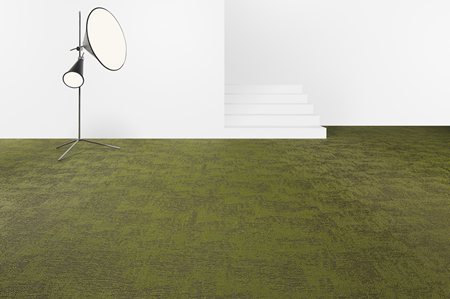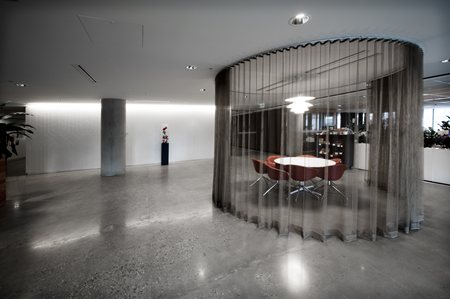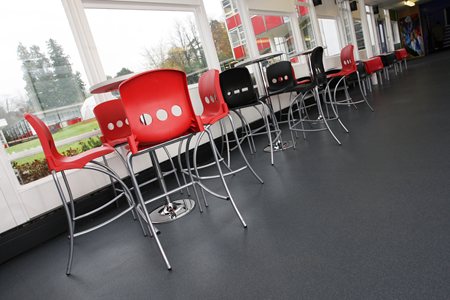Advances in technology mean more and more environmentally friendly flooring products are entering the market.
According to Good Environmental Choice Australia (GECA) standards, there are four key impacts of flooring on the environment - the raw types of materials used in the product; installation processes; maintenance and cleaning required for the flooring; and the energy used during manufacturing.
"In addition, environmental impacts can occur during use and maintenance and when the floor covering reaches the end of its useful life and becomes waste to be recycled, reused, reprocessed or otherwise disposed of," GECA says.
Below, BPN talks to Dick Clarke, principal at Envirotecture and regular judge of the BPN Sustainability awards, about some of the newest products he's been using. We also take a snapshot of some of the newest products to come onto the market this year.
Marmoleum
A new biodegradable flooring range is Striato Natures Grain.
Although the linoleum product has been in production for some time, Clarke swears by Forbo's Marmoleum products and has been using it for around 10 years.
Marmoleum is manufactured from 97 per cent natural raw materials, including rapidly renewable materials and recycled content. The flooring also has a life expectancy of over 25 years.
The company released a new variation to its biodegradable flooring range in April this year - the Striato Nature Grain, which has been inspired by the soft, strong, warm and cool striations found in nature.
The new collection comes in 17 designs and is finished with Forbo's Topshield coating for a R10 slip rating.
Clarke likes using the product because it has a benign production process, so chemicals aren't offgassed during production and in its finished state, it has zero VOCs, he says.
"Because floors make up a large proportion of the internal surface area of a building, it's very important that you get the offgassing down to zero wherever you can," Clarke says.
The installation process of Marmoleum is also environmentally friendly.
"There are no nasty adhesives and no solvents. Sometimes when they're cleaning up they might use a little bit of an alcohol-based solvent to clean up things, but there are no toluol or toluene involved, which is nice," Clarke says.
Coconut Wood
Coconut wood is another new sustainable flooring product to recently hit the Australian market.
"Coconut trees in plantations are grown for several years and then they become too tall and spindly and they chop them down and grow new ones," Clarke says.
These outer layers of the coconut trees have similar qualities to timber and can be turned into flooring products.
Coconut timber typically has a dark red brown colour and has dense features. Clarke says this means the product lends itself to being laid over thermal mass floors.
In internal applications it comes in a tongue and groove and the flooring can be finished with benign finishes and can produce unique patterns due to the unique vein lines in the product.
Although he concedes he has not seen any long-term testing on the product, Clarke says anecdotal evidence suggests it is durable for external use. He has also carried out his own testing - Clarke has left a sample piece of coconut wood at his office in sun and rain exposure for six months.
"It is weathering nicely - it's going a beautiful, elegant silvery colour, but because it's got that dark vein line in it, it's not a uniform silver," he says.
The test piece does not have any cracking on the surface, no splintering or any signs of deterioration, Clarke says, and he intends to use the product on future projects.
Create

Bolon's Create collection for 2012 is another new environmentally friendly flooring product released this year at the Stockholm Furniture Fair in February.
The collection features a 3D pattern, with the colour of the flooring changing between light and dark shades depending on three factors - where the occupant is standing in the room, how the light falls on the flooring and how it is laid.
Bolon claims Create is the company's 'greenest' collection and is manufactured from organic, renewable phthalate-free plasticisers. It also includes 25 per cent recycled content for the product's backing and can be recycled at the end of its life - Bolon has an arrangement with Melbourne recycling company, Cyro Grind.
Create comes in 10 designs, including five patterned and five solid colours in a sheet or tile application.
"Installation for the sheet product is as simple as directly sticking the sheet to the floor surface using a flooring installer. For the tile product a pressure sensitive adhesive is required so it has the option to be moved if required, similar to carpet tiles," says Mark Andrews, managing director at Bolon.
Concrete

With technological advances in concrete making it a much more environmentally friendly product, concrete in internal flooring applications is becoming more popular.
Several concrete companies now manufacture concrete with a lower embodied energy by replacing part of the energy-intensive Portland cement component with waste by-product materials, such as flyash and recycled aggregate. Some companies also use recycled water in the concrete's production.
"I know of at least one plant in Sydney that will do that, so that means you're not using freshly quarried materials, so the embodied energy of the whole concrete mix then comes down dramatically," Clarke says.
Pro Grind recently installed the largest commercial installation of polished concrete in Australia at Myer's new $175 million customer support centre in Melbourne.
Around 11,000sqm of polished concrete was used on the project, achieving five full points for the building's Green Star rating. The product has also helped reduce heating costs through the thermal mass of the flooring and lower lighting costs due to the reflective surface of the polished concrete.
During the installation, recycled dust from the flooring was used to fill holes in the slab. Other environmental benefits of the flooring include laying it over the existing concrete slab, preventing the existing flooring ending up in landfill.
"The main challenge of the installation was to coordinate the works over the 10 separate floors and work in with the other trades involved in the overall project," says Ben Vander Veen, sales manager at Pro Grind.
"Due to Pro Grind's unique installation process early on in the project, the flooring was instantly trafficable to the other trades people and required no rework on completion."
Aquarius

Altro's Aquarius flooring is another recent addition to the market, released in February this year.
The safety flooring has been designed to withstand several different types of foot traffic (shoes and barefoot) for wet and dry areas.
Inspired by customer feedback, the product has undergone three years of development and incorporates post-consumer waste in the raw material. The company says this diverts over 500 tonnes of factory-waste PVC from landfill.
"The vast majority of our products also contain up to 10 per cent recycled, post-consumer glass particulates as an integral raw material," says Mick Barbara, sales consultant at Altro.
The product is also 100 per cent recyclable.

